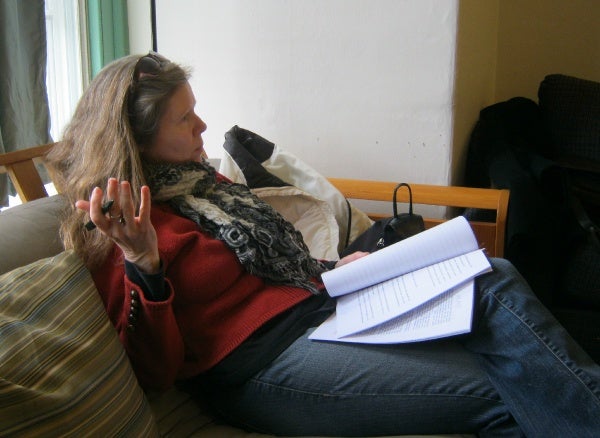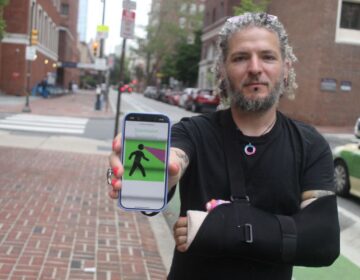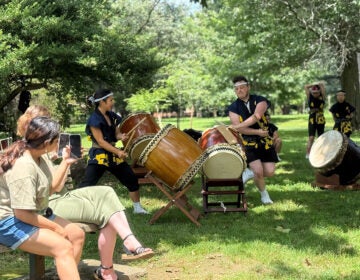Aspiring fiction writers face a ‘dark, lonely, miserable, bleak path’
The modern world is a tough one for writers: “it’s a dark, lonely, miserable, bleak path,” New York-based author Donald Breckenridge intoned gently to participants of a two-hour fiction-writing workshop he gave at Mt. Airy’s Big Blue Marble Books on Saturday.
Fiction editor of the Brooklyn Rail journal, founded in 2000 and boasting a print circulation of 20,000 readers, he speaks with experience. A playwright and author, Breckenridge published his third full-length novel, This Young Girl Passing, last fall.
Despite his own success, the black-clad writer insisted that “it’s really bleak out there.” As traditional publishers go under in the digital age, the competition among writers only increases. Rejection? “Yeah, well, there’s lots of that.”
To make things even worse, Big Blue Marble staffer and workshop participant Erica David confirmed that the bookstore doesn’t carry any of the literary journals that the workshop writers might dream of being published in, because not enough people buy the journals to justify stocking them.
“Here we are worried about being rejected by magazines that nobody reads,” Breckenridge quipped.
He regarded workshop participants, who submitted only a few pages of fiction for inspection after he’d requested 20, with a sleepy, benign bewilderment.
Budding writers aren’t always known for their confidence.
But as the session progressed and aspiring writers read from their pages and received constructive comment from each other and from Breckenridge, the local talent was evident.
In between tales on the trials of the slush-pile and a few real-life ghost stories, participating writers shared their work: one asked what we’d perceive if the infamous chupacabra donned a shirt and tie and went to work. With South Asian flavor, another shared a piece she’d developed about family heritage rooted in reflections on the coconut. Another piece took a darker turn, inspired by a real-life murder committed in a house that the writer once considered purchasing.
“Thank God we didn’t buy it,” she said – but she was glad to mine its history for a chilling short story.
Breckenridge was full of worthwhile advice for writers just starting out, and a healthy dose of humor about writers’ anxieties.
Participants raised the perennial concerns of those trying to break into the business – how in the world do you build up your resume when “you can’t get any experience until you get some experience”? Breckenridge urged the importance of close familiarity with the publications which you target with your work – in addition to what authors the editors of those publications are paying attention to. Breckenridge encouraged lots of submissions once you’ve done your homework – he called the ban on simultaneous submissions still occasionally found in the publishing world “a criminal waste of time”.
Another issue Breckenridge raised was that according to literary world statistics, far more men are being published than women. A participant added that there also seems to be a barrier to older writers, while under-30 writers are showered with all sorts of special showcases.
“The longer you write, the better you get,” Breckenridge said of the value of older writers.
Those who aren’t writers might think that the most troublesome thoughts appear before you get published (assuming you ever do), but that you become more confident once you’ve found a measure of recognition.
But all participants, including the author himself, commiserated heavily on the woes of pages that seem utterly inspired one day and then insufferable the next. “I can’t even open it without wanting to rip my hair out of my head and light every copy on fire,” Breckenridge says of his first novel. Hyperbole aside, it seems that some writers’ second-guessing is ingrained regardless of objective success.
The discussion lingered on the inexorable death of traditional publishing houses in the digital world. “Nobody’s buying books anymore,” Breckenridge said. Therefore, many writers are catering to their own creative needs rather than a large audience. But there is a bright side.
“Every time you go online, there’s a new lit mag starting up,” he said. Just because the older models are changing doesn’t mean that people aren’t reading and writing. He also told participants that the dawn of your career is the best time possible to be a writer: it’s a peerless moment when you’re discovered for the very first time by an editor or publisher.
“It takes a certain kind of confidence,” he said of pursuing a writing career. “Or a certain kind of insanity. It takes both.”
WHYY is your source for fact-based, in-depth journalism and information. As a nonprofit organization, we rely on financial support from readers like you. Please give today.








